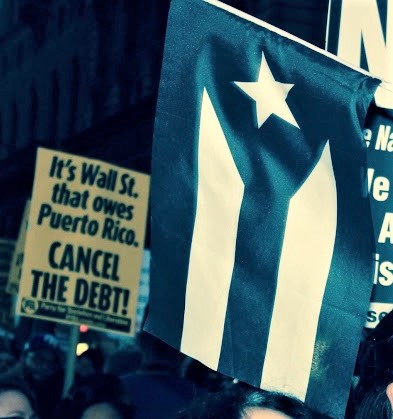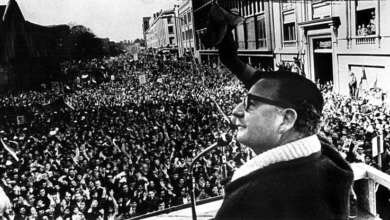Hundred of activists gathered in the shadow of New York City’s Trump Tower Oct. 3. Called together by the Puerto Rican Nationalist Party, Prolibertad and others, people from different backgrounds and affiliations united in a massive showing of solidarity with Puerto Rico. They protested all the atrocities committed against our island nation—from the massive debt imposed by U.S. banks to colonialism and the lax response of the U.S. government in the wake of Hurricane Maria.
This action was timed to coincide with Donald Trump’s first visit to Puerto Rico a full 13 days after the disaster. When he arrived that morning, 95 percent of the people still did not have electricity, and a third of the island’s 1,100 gas stations were still closed, as were half of the 456 grocery stores. Only 50 percent of the major roadways had been cleared. Less than half of the people had running water, and food was scarce for both homes and hospitals. Less than a fifth of the cell towers were working and many Puerto Ricans in the U.S., including this reporter, had still not heard from all family members.
Yet Trump, reflecting the view of the biggest U.S. banks, complained about the high cost of saving Puerto Rican lives and resupplying the island! He belittled the scope of the damage done by Maria, saying it wasn’t a “real catastrophe” like Hurricane Katrina. While necessities remain in the island’s ports undistributed, Trump had the nerve to repeatedly praise himself and the U.S. rescue effort.
Passion for our patria

At Trump Towers, the battle cry of the demonstrators was passion for our patria (country). Though crowded inside police barricades with little elbow room, protesters formed one huge picket line, waving Puerto Rican flags, blowing whistles, chanting “Lucha si, entrega no!” and dancing congas to drums and maracas.
Demonstrators carried signs and banners calling for an end to colonialism, abolishing the Jones Act as it applies to Puerto Rico, giving Puerto Rico the freedom to choose what countries it wants to trade with, canceling the massive debt, paying reparations for 119 years of colonialism, and sovereignty and full independence for Puerto Rico.
Many at the protest expressed the view that if this was a war of U.S. aggression overseas, the United States would make food, water, generators, and medical supplies available to its soldiers right away.
Some activists called out East Harlem’s City Council Representative Melissa Mark Viverito when she arrived. Mark Viverito backs a zoning plan that many feel will drastically raise rents and force Puerto Ricans and other Latinos out of East Harlem.
The Oct. 3 action was the strongest protest since the crisis began. On Sept. 19, a group of Puerto Ricans and their Palestinian allies protested in front of the United Nations to call attention to the fact that the U.S. colonial occupation of Puerto Rico is illegal.
The hurricane hit the next day, and Puerto Ricans and their supporters across the U.S. began collecting supplies en mass. On Sept. 28, a larger protest targeted the U.S. government for its lack of relief action. Many went from the protest to the Justice Center to work on logistics of getting hurricane relief to our brothers and sisters on the island.
Puerto Rico has been a colony since it was brutally stolen from its Taino inhabitants, first by Spain in the late 15th century and later by the U.S. in 1898. Today, Puerto Rico is still a colony. Puerto Ricans, though U.S. citizens, cannot vote for president, yet they have been drafted to fight in U.S. wars of conquest. The island is strangled by the Jones Act and controlled by Wall Street banks.
Through centuries of oppression and colonialism, the Puerto Rican people have always resisted and retained our own distinct cultural identity, our own language, our own history, our own food, our own music. The Puerto Rican people have now withstood one of the worst hurricanes in history. Many things have been swept away, but not our determination to resist and not our passion for our patria. “Que viva Puerto Rico libre!”






